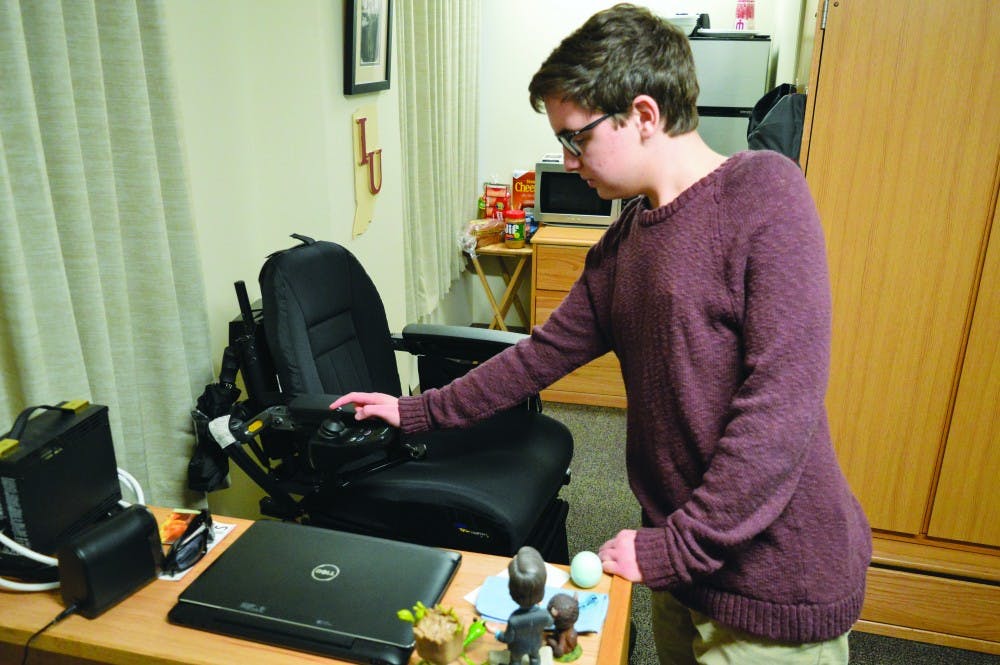For freshman Max McLinn, the difference between sympathy and pity is vital.
“In being sympathetic, people help me when I need it but still treat me like a normal human being otherwise, understanding I have limitations, but not changing their perspective or demeanor toward me as a result,” he said. “When people pity me, on the other hand, they tend to do things like stare and treat me more like a puppy than a man, calling me ‘buddy’ or ‘pal’ at the end of every other sentence along with a condescending pat on the shoulder.”
Since March 2015, McLinn — a student from Valparaiso, Indiana, living in the Honors Residential Community in Briscoe Quad — relies on a wheelchair to move.
As a kid, he played little league basketball and baseball, but was often frustrated by how slowly he moved compared to teammates. His parents also noticed the waddle in his run.
“That was the first sign that things would be always be different for me,” McLinn said.
McLinn has limb-girdle muscular dystrophy (LGMD), a group of disorders primarily affecting voluntary muscles around the hips and shoulders. All forms of MD are degenerative, meaning symptoms develop and worsen over time.
But when McLinn heard the diagnosis in fourth grade, he said that did not initially sink in. He still played sports with his friends, just not competitively like before.
“I didn’t feel comfortable playing (competitively) because after I knew there was an actual difference between me and everyone else, I didn’t like people seeing it,” he said.
Slowly, though, McLinn began to see the effects of LGMD in his daily life. He fell more frequently and required assistance to stand again.
“It feels like your body is betraying you, and that hurt me,” he said. “It implied a lack of independence, the likes of which I hadn’t felt before.”
Now, walking was dangerous. As a result, McLinn spent his last three years of high school taking classes online.
“It was nice to start off with because I didn’t have to do all of the walking I would need to in high school, which would have been really hard, but then there was a really isolating aspect to it,” he said. “It was not socially optimal.”
However, McLinn did attend one class within the walls of Valparaiso High School: Latin. Encouraged by his interest in history and his desire to learn an ancient language, he enrolled his freshman year and continued attending until graduation. At IU, he switched to Italian, what he calls “the modern version” of the language he loved in high school.
In March 2015, after realizing he could no longer rely on his feet to carry him, McLinn sat in his wheelchair for the first time.
“Walking around is an inborn thing you know and learn how to do very early on, and to go from something so natural to controlling all your movements with a joystick is really odd,” he said. “Now I have to be more deliberate in my movements, even though moving itself should be effortless.”
The online courses meant McLinn had little experience using his wheelchair before starting college. From university buses with wheelchair-accessible ramps to taxis giving a 50-percent discount to wheelchair passengers, Shirley Stumpner, Director of the Office of Disability Services for Students, said the University and city work hard to make Bloomington as accessible as possible for students like McLinn.
“We also work with students who have non-apparent disabilities that still make it challenging to get around,” she said. “Last year we had 45 students with permanent mobile impairments, but only three or four were in wheelchairs.”
McLinn chose IU based on its programs, but accessibility solidified his decision to attend.
“Our biggest goal is making university life accessible,” Stumpner said.
She said students are guaranteed rides around campus in one of the office’s two vans. However, McLinn chooses to get around on his own when he can, noting it takes him less time to wheel to his class in Ballantine Hall from Briscoe than it would for students walking the same path.
So far, he’s only used the van service once, after the night’s 5 inches of snowfall were not cleared before his class.
“Anytime I’ve had a problem, it’s fixed in an incredibly timely fashion and every person has been very helpful,” McLinn said. “One small improvement would be having maintenance crews run regular tests to ensure everything works.”
Certain aspects of getting around IU have been challenging for McLinn — the slight raise between the median and road at the crosswalk between McNutt Quad and Foster Quad, or the journey from his Italian class in Woodburn Hall to his media discussion section in Willkie Quad where he relies on freight elevators and accessible entrances in multiple buildings to arrive on time every day.
Despite all this, he said he is happy to call Bloomington home. He smiles as he talks about his favorite IU memory, attending the first football game in Memorial Stadium last semester.
“It’s not ideal, but it’s definitely doable and worth it,” he said.






